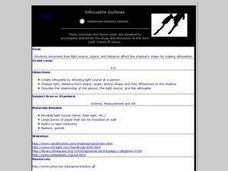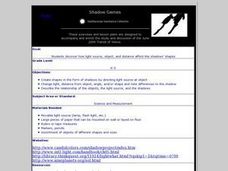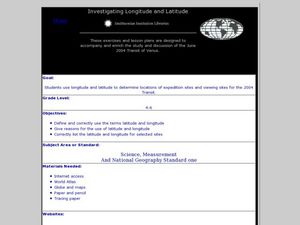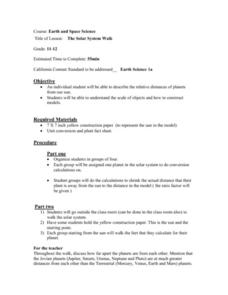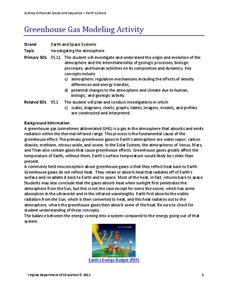Curated OER
The Goldilocks Principle: A Model of Atmospheric Gases
Students discuss the characteristics of the Goldilocks Principle. They discover the pressure and chemical composition of Venus and Mars. They discuss how the Earth's temperature is affected by the atmosphere.
Curated OER
Solar System
In this outer space worksheet, pupils cut at illustrations of Mercury, Venus, Earth, Mars, Pluto, and the moon. Students paste them together in their correct arrangement.
Curated OER
The Transit in Pictures
Students investigate the Transit of Venus and create and produce a public service commercial promoting the Transit of Venus and providing information about its safe viewing.
Curated OER
Communication: Gender Issues
Students participate in a lesson that investigates the different ways that people communicate. The roles of gender in communication is covered by using the book "Men Are From Mars, Women Are From Venus". They also write the meaning of...
Curated OER
Paper Plate Observation
Students analyze transits from previous scientists. They identify simple objects that could have been used for documentation in the science world. They also practice scientific inquiry using methodology.
Curated OER
Expedition Diaries
Young scholars select an expedition to research, form expedition teams, keep individual diaries and compare diaries at the end of the simulated expedition. A variety of source documents are utilized in this lesson plan.
Curated OER
On the Shoulders of Giants
Students research the important events that were taking place during the major expeditions and make presentations on how they may have influenced the expeditionary teams. There are some excellent websites imbedded in this plan.
Curated OER
Two Views of the Universe
Students build the two models of the universe created by Aristotle and Copernicus. They compare and contrast the two universes. They create hypothesis on how each model functions.
Smithsonian Institution
Geometric Shapes Collage
Junior geometers practice stating the names of different geometric shapes. They define and name the different shapes and compare and contrast shapes to one another. They also relate the shapes to objects in the real world.
Curated OER
Silhouette Outlines
Students create a silhouette by directing light at a person. They change the light, distance from the person and angle to make the shadows different. They are to describe the relationship between the light source and the object.
Curated OER
Shadow Games
Students create different shapes by putting light on different objects. They change the distance from the object, the light source and angles to make the shadows different. They are to describe the relationship between the light, object...
Curated OER
On the Shoulders of Giants
Learners select an astronomer or scientist from the past, research the role that they played in the development of the heliocentric revolution, and make presentations on their achievements.
Curated OER
Investigating Latitude and Longitude
Students examine the lines of latitude and longitude on a map, and explain why these lines might be useful. For this lesson students also explore websites that provide information to improve their understanding of how and why latitude...
Curated OER
Planets in the Solar System
Explore the planets with your young Spanish speakers. First, read Los Planetas by Chris Jaeggi. Then create a class solar system using different size balls as planets. They'll love helping you put it together!
Curated OER
Monster Plants Storia Teaching Guide
Who wouldn't want to read a book about monster plants? Get those kids into informational texts with an engaging topic, like meat eating plants! You'll use the teaching guide to provide structured practice as your class reads to...
PHET
Planetary Magnetism
What do magnetic fields look like? The best way to learn about magnetic fields is to try identifying them for yourself. Scholars will understand the importance of magnetic fields after completing this experiment. The extension activities...
Curated OER
The Solar System Walk
A unique lesson on the solar system, and some of the mathematics associated with it, is here for your high schoolers. Pupils are put into groups of four, and each group is assigned one of the planets from our solar system. They must...
Curated OER
Making Models of the Solar System
Students make several models of the solar system to learn the positions of the planets in the solar system as well as relative distances and sizes. Creation of these models will help them identify the planets by size, shape, color,...
Curated OER
Modeling the Solar System
Students build a scaled model of the solar system. In this space science lesson, students arrange them according to their distances from the sun. They analyze each planet's unique features such as density and relative gravity.
Hawaiʻi State Department of Education
Color Moods
Can art be a mode of communication? You bet it can! Learners explore how colors are used to convey mood in art. First, the class listens to three very unique musical selections that convey three different moods. Then, they compare and...
McGraw Hill
Study Guide for Island of the Blue Dolphins
Dive your class into a reading of Island of the Blue Dolphins with this in-depth study guide. Breaking the novel into three parts, the resource begins each section with a focus activity that identifies a specific theme or question to be...
Virginia Department of Education
Solar System Model
How many planets can you name? Did you get all 13 in our solar system, including the dwarf planets, or were you surprised when you read there are 13 planets? The instructional activity helps scholars understand the scale of the universe...
Virginia Department of Education
Planet Line-Ups
Should Pluto be considered a planet or a dwarf planet? Scholars research planets in our solar system to understand their similarities and differences. It also includes memory activities related to the order of the planets.
Virginia Department of Education
Greenhouse Gas Modeling Activity
Why are greenhouse gases called greenhouse gases? Young Earth scientists learn about greenhouse gases though experimentation in the second installment of a 3-part series. They use lamps to model radiant energy as well as warming through...
Other popular searches
- Planet Venus
- Venus Fly Trap
- Greenhouse Effect Venus
- Mars Venus
- Observing Venus
- Mars and Venus
- Venus Lesson Plans
- Venus Return
- Solar System; Venus
- Venus Fly Trap Plants
- Venus Flytrap
- Venus Fly Trap Experiments











